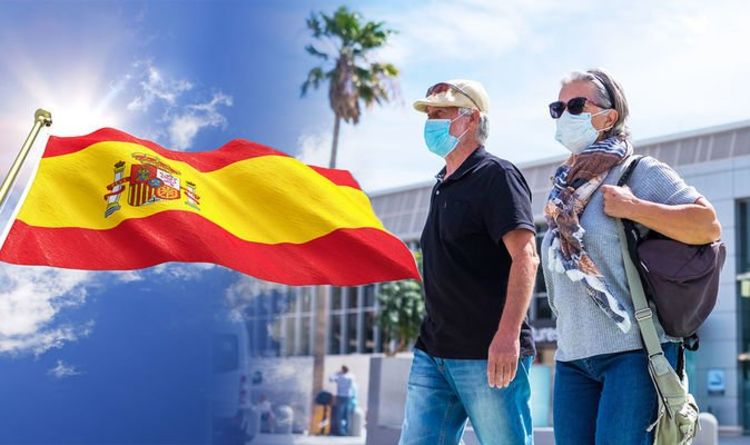Spain holidays: ‘It’s not that complicated’ – 5 things Britons must do before jetting off
Spain: Paul Scully discusses amber list
We use your sign-up to provide content in ways you’ve consented to and to improve our understanding of you. This may include adverts from us and 3rd parties based on our understanding. You can unsubscribe at any time. More info
Spain has seen an influx in tourists in recent months as travel restrictions have started to ease. However, there are still a number of safety and entry requirements for UK arrivals which are vital.
Kate McWilliams is the associate director of LOTUS which represents both national and regional tourist boards across Spain.
She spoke with Express.co.uk to share some vital insights into how UK tourists can ensure a safe and smooth journey to the much-loved holiday hotspot this summer.
Fill in the appropriate pre-departure forms for entering Spain
Ms McWilliams explained: “Firstly, all passengers need to fill in the Passenger Locator Form.
”The Passenger Locator Form can be downloaded online from the Spain Travel Health Portal. This must be completed by passengers regardless of whether they are travelling via air, land or sea, and must be done within the 48 hours prior to arriving in Spain.


However, the Foreign, Commonwealth and Development Office (FCDO) warns it shouldn’t be completed more than 48 hours prior to arrival.
Ms McWilliams said: “Luckily, it’s not that complicated.”
However, she did note that the form does differ depending on whether a passenger is travelling by air or sea.
Those travelling by sea, such as on a ferry or cruise ship, must download their form from the Spain Travel Health portal maritime website.
Once the health control form is downloaded and filled out, travellers will be issued with a QR Code to show it at the control points upon arrival in Spain.
DON’T MISS
‘We can’t cope with the influx’: Waitress on ‘busiest ever’ Cornwall [INTERVIEW]
Croatia may move to amber list this week – Spain will NOT go red [PREDICTION]
Northern Railway’s £1 flash sale starts today [DEAK]
Ensure you have the correct Covid vaccination or testing evidence
While Spain is allowing Britons to visit for non-essential purposes, including holidays, there are some strict entry requirements in place.
Ms McWilliams explained: “Visitors that are fully vaccinated at least 14 days prior to their arrival will just need to show their Covid vaccination record.
“The NHS Covid pass, which can be downloaded from the app, is fine.”
Passengers must have received both doses of a COVID-19 jab in order to use vaccination as a method of entry.
Spain is also welcoming back visitors who have not been vaccinated.
Ms McWilliams continued: “If visitors haven’t had both vaccines, they will need to show evidence of a negative Covid test (NAAT type) from within 72 hours prior to their arrival.
“This is not necessary for children under 12 who are exempt.
”Once arriving in Spain, Ms McWilliams says there are no further health checks.
However, the FCDO warns that arrivals may be questioned by border authorities to ensure they meet the legal requirements.
The travel authority states: “Spanish border authorities will only grant entry if they are satisfied that you meet the entry requirements and reserve the right to deny passage.
“Anyone who presents symptoms or fails to meet one of the requirements will be required to undergo a test on arrival and will be obliged to observe the COVID-19 protocols in place as determined by the local authorities of your destination in Spain.
“Passengers may also be contacted and required to undertake a PCR, TMA or LAMP test at any point up to 48 hours after their arrival in Spain.”

Protect yourself with the right travel insurance
Travelling during the pandemic comes with the added risk of disruption.
Whether it’s sudden global travel restriction changes, or holidaymakers unexpectedly testing positive for coronavirus while abroad, it’s a wise idea to make sure you have adequate protection before jetting off.
Ms McWilliams advised: “I would recommend visitors take out their own insurance policy which includes COVID medical expenses. Companies such as battleface offer policies irrespective of FCDO advice or traffic light colour.”
However, she also pointed to some new schemes launched by regional tourism bodies in Spain.
She explained: “From an insurance perspective, it has been interesting to see Spanish regions try to tempt back British visitors by offering insurance policies in the event of a COVID-19 infection.
“We have seen policies offered from regions including Andalucía, the Balearic Islands and the Costa Cálida – Region of Murcia.
“Whilst these policies can offer extra peace of mind, they do vary in what benefits they offer.
“For example, in most cases, the visitor has to be staying in ‘regulated tourist accommodation’ and most importantly, these policies only relate to COVID-19, so are not a replacement of normal travel insurance cover.”
The FCDO adds: “No travel is risk-free during Covid. Countries may further restrict travel or bring in new rules at short notice due to a new COVID-19 variant.
“Check with your travel company or airline for any transport changes which may delay your journey home. If you test positive for COVID-19, you may need to stay where you are until you test negative.
“Plan ahead and make sure you can access money, understand what your insurance will cover and can make arrangements to extend your stay and be away for longer than planned.”
See the latest Covid vaccine stats below and visit InYourArea for all the Covid vaccine latest
Don’t forget to pack important Covid-safe items
Catching Covid can be an entirely uncontrollable thing.
However, there are ways to reduce your risk of testing positive while on holiday.
Ms McWilliams recommends travellers always pack enough hand sanitiser and face masks for the duration of their trip.
She added: “The face mask is still mandatory in indoor closed spaces and on public transportation.
“Effectively, we recommend visitors taking the same precautions that they would take in the UK.”
Be prepared to follow safety measures set out by Spanish authorities
Much like in the UK, there are rules and measures in place across Spain that should be followed.
It is vital holidaymakers follow the Covid-safe practices.
Ms McWilliams said: “The Spanish travel sector has put in place a whole host of protocols to protect visitors and those employed in the tourism sector.
“These include procedures around cleaning and disinfection, limited occupancy levels, sanitiser stations and the increased digitalisation of services in hotels and restaurants to minimise people to people transactions.
“As those travelling back to the UK will need a test prior to arriving. Many hotel groups have also started offering testing on site.”
Source: Read Full Article


